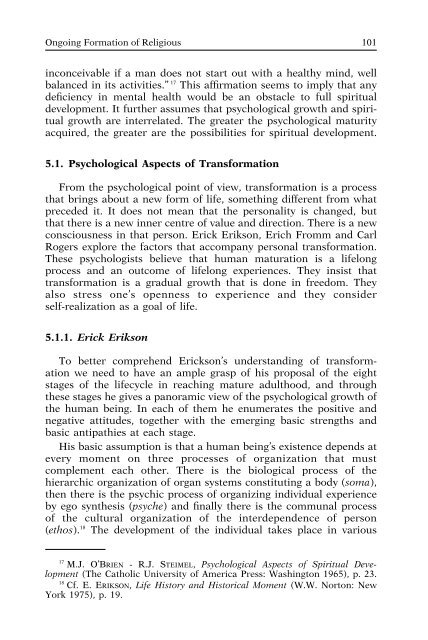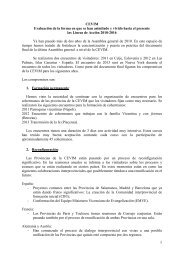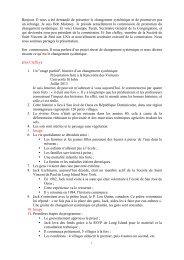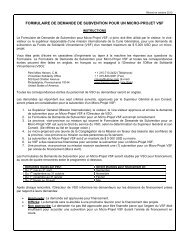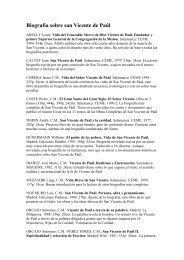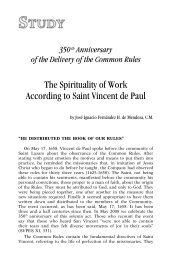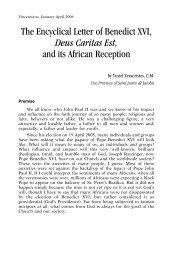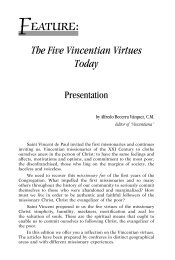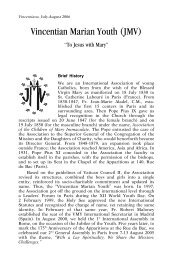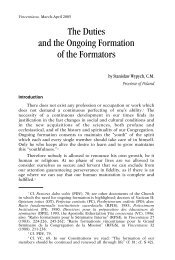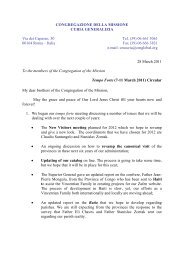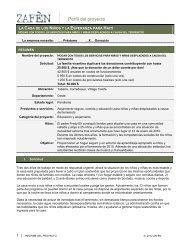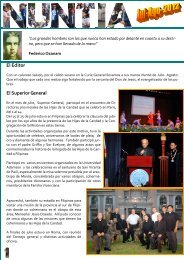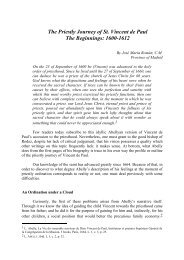Ongoing Formation of Religious - CMGlobal
Ongoing Formation of Religious - CMGlobal
Ongoing Formation of Religious - CMGlobal
Create successful ePaper yourself
Turn your PDF publications into a flip-book with our unique Google optimized e-Paper software.
VINCENTIANA 1/2-2008 - INGLESEApril 17, 2008 − 4ª BOZZA<strong>Ongoing</strong> <strong>Formation</strong> <strong>of</strong> <strong>Religious</strong>101inconceivable if a man does not start out with a healthy mind, wellbalanced in its activities.” 17 This affirmation seems to imply that anydeficiency in mental health would be an obstacle to full spiritualdevelopment. It further assumes that psychological growth and spiritualgrowth are interrelated. The greater the psychological maturityacquired, the greater are the possibilities for spiritual development.5.1. Psychological Aspects <strong>of</strong> TransformationFrom the psychological point <strong>of</strong> view, transformation is a processthat brings about a new form <strong>of</strong> life, something different from whatpreceded it. It does not mean that the personality is changed, butthat there is a new inner centre <strong>of</strong> value and direction. There is a newconsciousness in that person. Erick Erikson, Erich Fromm and CarlRogers explore the factors that accompany personal transformation.These psychologists believe that human maturation is a lifelongprocess and an outcome <strong>of</strong> lifelong experiences. They insist thattransformation is a gradual growth that is done in freedom. Theyalso stress one’s openness to experience and they considerself-realization as a goal <strong>of</strong> life.5.1.1. Erick EriksonTo better comprehend Erickson’s understanding <strong>of</strong> transformationwe need to have an ample grasp <strong>of</strong> his proposal <strong>of</strong> the eightstages <strong>of</strong> the lifecycle in reaching mature adulthood, and throughthese stages he gives a panoramic view <strong>of</strong> the psychological growth <strong>of</strong>the human being. In each <strong>of</strong> them he enumerates the positive andnegative attitudes, together with the emerging basic strengths andbasic antipathies at each stage.His basic assumption is that a human being’s existence depends atevery moment on three processes <strong>of</strong> organization that mustcomplement each other. There is the biological process <strong>of</strong> thehierarchic organization <strong>of</strong> organ systems constituting a body (soma),then there is the psychic process <strong>of</strong> organizing individual experienceby ego synthesis (psyche) and finally there is the communal process<strong>of</strong> the cultural organization <strong>of</strong> the interdependence <strong>of</strong> person(ethos). 18 The development <strong>of</strong> the individual takes place in various17M.J. O’BRIEN - R.J. STEIMEL, Psychological Aspects <strong>of</strong> Spiritual Development(The Catholic University <strong>of</strong> America Press: Washington 1965), p. 23.18Cf. E. ERIKSON, Life History and Historical Moment (W.W. Norton: NewYork 1975), p. 19.


